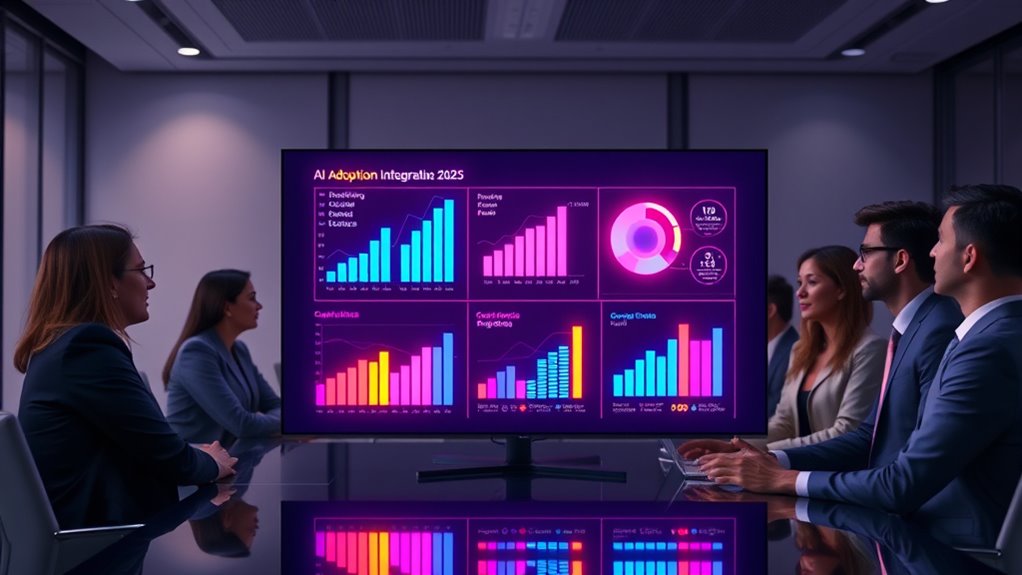In 2025, over 70% of companies are integrating generative AI into their core operations, shifting from experimentation to strategic use. You’ll find businesses leveraging AI for personalized experiences, content creation, automation, and innovative workflows across industries like retail, entertainment, and finance. Many smaller firms are adopting AI tools quickly, supported by growing infrastructure and investments. Staying ahead means understanding just how deep AI’s integration is becoming—discover more about these transformative trends below.
Key Takeaways
- Over 70% of enterprises have integrated generative AI into core operations, shifting from experimentation to strategic deployment.
- Industries like retail, entertainment, and finance utilize AI for personalized experiences, content creation, and financial analysis.
- About 45% of SMBs now adopt generative AI tools for customer service, automation, and product development.
- Companies are increasing AI budgets, investing in infrastructure, training, and custom solutions to support long-term growth.
- Success depends on traits like adaptability and collaboration, with AI becoming a standard component across industries by 2025.

Have you ever wondered how rapidly generative AI is transforming industries? In 2025, it’s clear that companies across the globe are embracing this technology at an unprecedented pace. You can see it in everything from marketing campaigns to product development, as businesses recognize the advantages of leveraging AI-driven creativity and automation. According to recent statistics, over 70% of enterprises now incorporate generative AI into their core operations, reflecting a noteworthy shift from experimental adoption to strategic integration. This rapid adoption is driven by the clear benefits AI provides—reducing costs, accelerating innovation, and personalizing customer experiences.
You might notice that industries like retail and entertainment are leading the way. Retailers use generative AI to craft personalized shopping experiences, generating product recommendations, customized marketing content, and even virtual try-ons. In entertainment, studios employ AI to create realistic visual effects, generate scripts, and develop immersive experiences. These applications are not just add-ons; they are now central to how these industries operate. For example, nearly 80% of entertainment companies report using AI to streamline content creation, saving time and resources. Meanwhile, in finance, 65% of firms leverage AI to generate financial reports, analyze market data, and develop investment strategies, enhancing decision-making speed and accuracy.
You also need to understand that the adoption isn’t limited to large corporations. Small and medium-sized businesses are catching on quickly, with about 45% now using generative AI tools to improve customer service, automate routine tasks, and develop new products. The affordability and accessibility of AI platforms have made it easier for smaller firms to experiment and integrate AI into their workflows, leveling the playing field. This democratization of AI is fueling innovation across sectors that once relied solely on human effort. Additionally, the emphasis on personality traits like adaptability and collaboration is increasingly critical for successful AI integration.
Furthermore, the statistics reveal that nearly 60% of companies plan to increase their AI budgets markedly in the coming year, indicating long-term commitment. They’re investing in training, infrastructure, and custom AI solutions tailored to their specific needs. You can see this reflected in the growth of AI-as-a-Service offerings, which help businesses deploy AI models without requiring extensive in-house expertise. As a result, AI-driven automation and content generation are becoming standard practice, transforming how companies operate daily.
Frequently Asked Questions
What Industries Are Leading in Generative AI Adoption in 2025?
You’ll find that tech, finance, and healthcare industries are leading in generative AI adoption in 2025. Tech companies leverage GenAI for innovation, automating coding and creating content. Finance firms use it for risk analysis and personalized services, while healthcare employs it for diagnostics and patient interaction. These sectors recognize AI’s potential to boost efficiency, improve customer experiences, and drive competitive advantage, making them the forefront of AI implementation this year.
How Do Small Businesses Implement Genai Solutions Effectively?
You can implement GenAI solutions effectively by starting small and focusing on specific tasks that streamline your operations, like customer service or content creation. Use user-friendly platforms and leverage tutorials or vendor support to get up to speed quickly. Regularly evaluate performance and gather feedback to refine the tools. Collaborate with tech partners if needed, and prioritize data security to guarantee your AI integration benefits your business without risks.
What Are the Biggest Challenges Companies Face When Adopting Genai?
You face several challenges when adopting GenAI, including high implementation costs, ensuring data privacy, and managing integration with existing systems. You might also struggle with a lack of skilled personnel and understanding how to effectively train the AI. Additionally, maintaining ethical standards and avoiding biases can be tough. Overcoming these hurdles requires careful planning, investing in training, and staying updated on best practices.
How Is Genai Impacting Customer Experience Strategies?
Imagine chatting with a customer service chatbot that instantly personalizes responses based on your history. That’s how GenAI transforms customer experience strategies. It enables you to deliver 24/7 support, automate routine inquiries, and create tailored interactions. This boosts satisfaction and loyalty. By integrating GenAI, you make your customer interactions more engaging, efficient, and personalized, giving your brand a competitive edge in today’s fast-paced digital landscape.
What Ethical Considerations Are Associated With Genai Deployment?
You need to consider ethical issues like data privacy, bias, and transparency when deploying GenAI. It’s vital to guarantee that the data you use respects user privacy and isn’t biased, which can lead to unfair outcomes. You should also be transparent about AI usage, so users understand when they’re interacting with AI and how their data is handled. Prioritizing these ethics helps build trust and responsible AI integration.
Conclusion
As you explore how companies are embracing generative AI in 2025, it’s clear this tech is transforming industries. Imagine your team using AI to craft personalized marketing content effortlessly, boosting engagement and saving time. For example, a retail giant might use GenAI to generate tailored product descriptions, increasing sales. Embracing these stats shows you’re on the cutting edge—ready to innovate and stay competitive in this rapidly evolving landscape.










